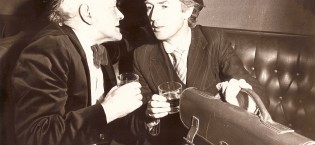Sligo Drama Circle in “Montserrat”
 A man’s tortuous conscience is often his most relentless enemy. Invariably, such a person’s mind is shattered by conflicting thoughts of what is right and what is wrong and his innate ability and dedicated ambition to do just what is correct are usually misinterpreted. When the lives of six innocent people depend on the balance of a man’s conscience, the general situation takes on a more turbulent shape and, consequently, one finds there is little that transcends the will to live. The Sligo Drama Circle’s presentation of “Montserrat” by Lillian Hellman from the French of Emmanuel Robles, in the Town Hall, Sligo, this week, pin-pointed only too clearly the weaknesses of man. At the same time, there was always the question of what should be placed first – one’s life or one’s country.
A man’s tortuous conscience is often his most relentless enemy. Invariably, such a person’s mind is shattered by conflicting thoughts of what is right and what is wrong and his innate ability and dedicated ambition to do just what is correct are usually misinterpreted. When the lives of six innocent people depend on the balance of a man’s conscience, the general situation takes on a more turbulent shape and, consequently, one finds there is little that transcends the will to live. The Sligo Drama Circle’s presentation of “Montserrat” by Lillian Hellman from the French of Emmanuel Robles, in the Town Hall, Sligo, this week, pin-pointed only too clearly the weaknesses of man. At the same time, there was always the question of what should be placed first – one’s life or one’s country.
This was a very difficult play and was a sharp contrast to the one staged twelve months ago by the same group. There was immeasurable scope for good acting and the various members of the cast took this in their stride. The play was excellent and even the hardened critic would only be too willing to take the opportunity of congratulating the players. The action took place in the outer room of the General’s Palace during the Spanish occupation of Valencia in Venezuela in the year 1812. One of the Spanish Captains, Montserrat, is accused of treason and he readily admits the charge. However, what he will not disclose is the whereabouts of the rebel leader, Simon Bolivar, “The Liberator”, who was a Venezuelan of Spanish descent. In 1811, at the age of 28, Bolivar led his people into rebellion against the Spanish and within ten years, he won liberty for Venezuela and Columbia. He then went to the assistance of Peru and during the wars, his fearless deeds and thrilling escapes made him a living legend.
Montserrat believes in Bolivar. He sees him as a true liberator and a true leader. His obdurate will can only direct him to do the right thing but before the play reaches its climax even he begins to wonder should he bow to the request of the Spanish Colonel, Izquierdo, whose grotesque and denunciatory manner brought about an extremely delicate situation. Izquierdo knows only too well that ordinary torture will not loosen Montserrat’s tongue and he realises he must revert to a subtle mode of torture. He orders that six innocent people be taken from the Square and together with Montserrat, he leaves them all together in a room for one hour. At the end of that hour, if Montserrat has not disclosed the hiding place of Bolivar, Izquierdo promises to shoot all six people.
And what a queer collection of people they are. Truly, one might say, a cross-section of the population had been thrown at the mercy of Captain Montserrat. There was Salas Ina, the wealthy merchant who knew exactly what he wanted in life and had waited long enough to get it. The uneasy confidence of Montserrat’s deranged mind failed to impress him at the start. The whole thing was nothing but a cruel joke – something about which he could tell his charming wife when he got home. He had everything to live for and the stubborn temperament of any man was not going to come between him and his plans for the future. The congenial approach to the matter soon disappears, however, as he slowly begins to realise the full and bitter meaning of his plight, and he becomes near-delirious in his efforts to move Montserrat.
As Salas Ina, Paddy Dooney gave what was, perhaps, his best ever performance. The character was portrayed with expert sincerity and the ingenious fashion in which he moved across the stage was faultless. His hands and eyes were used to trace the full meaning and painful reality of the scenes. Like the others he had two separate characters to play – firstly the rich merchant who had the best part of his life to live and secondly, the pitiable broken man who was facing a quick and unexpected death. Both parts were realistically painted. Salcedo, a professional actor, was played by Walter Mc Donagh. The fact that he was a Spaniard did not raise him above the others, except, perhaps, in his own estimation. He had played before royalty and before the nobility and he had his mother and father to support so he could not afford to die. Such a fate seemed obscure in view of the fact that he was a devoted Royalist but he, too, soon realised that Izquierdo meant business and he saw that his life was very much in the balance and only a word from Montserrat could save him.
At other times and in other places, he had played the death scene from a famous play to perfection but now his time had come to play it in real life. However, he managed to hold his head high while he spoke his heroic and forgiving words. Walter Mc Donagh has never given a second rate performance on a Sligo stage but he surely surpassed himself this time. The part seemed to be made just for him and his words of comfort often tended to allay the fears of the others. The character was instilled with that living vitality which made it appear so real and the true significance of the final brutal scene was reflected only too clearly through this actor.
Luhan, played by Brian Bohan, was a comparatively young but up-and-coming wood carver and although he was a poor man, his work was well known and many of his pieces had found a resting place in museums. Undoubtedly, he was the most hot-blooded of the six prisoners and at first he was prepared to kill rather than be held captive. Seemingly, he alone took the Colonel seriously from the very start but in the end, he resigned himself courageously to his fate. Many will remember Brian as Larry Ward in “God’s Gentry” and on this occasion, as before, the standard of acting he attained was definitely first class. The verve and energy with which he characterised his role were the ideal qualities and fitted the situation perfectly.
The fourth male prisoner was Ricardo, played by Lionel Gallagher, a newcomer to Sligo audiences. He was naturally interested in seeing his country freed from the Spanish oppression but he never pictured himself dying like this. He was the youngest of the six yet he was prepared to accept death quicker than either Salas Ina or Salcedo. This young actor gave a meritorious performance and his accent and dejected countenance never failed to impress. And then there were the two female prisoners, Marie Mulvihill as Matilde and Monica Toher as Felisa. In the circumstances, no two characters could have been more different. Matilde was a young mother who had locked her two children in a room at her home and unless she returned quickly to free them, they would die. Naturally, she was under intense strain and she even promised to return to the Palace if she was allowed to return home to release the children.
Marie Mulvihill knew exactly how to radiate her motherly instinct and her pleas for mercy rang bitterly in the hearts of her friends and enemies. Her soothing manner and her absolute disbelief in what was happening rendered her all the more pitiable while her failure to grasp the magnitude of the situation was something definite and real. Felisa, on the other hand, was the only person who supported Montserrat from the very start. She knew little of the ways of love but she believed in Bolivar and she was ready to die for him. She had no need for a simulated appearance and the ghoulish promises of the Colonel did not trouble her as much as the others. Monica Toher fitted the role perfectly. She had little to say in the earlier scenes but her eyes depicted her thoughts and one could always detect a certain fear behind her unschooled face. Her derogatory remarks to the Colonel were made with all the fire and hatred of a woman who believed in herself and believed in what she was saying.
What was the character of the man who held the lives of these people in the palm of his hand? Was he the cruel monster Salas Ina made him out to be or was he a quiet and inoffensive person who foresaw the end of Spanish rule in Venezuela and who believed the time had come when someone had to make a stand? This was how he appeared in the eyes of Felisa. Montserrat, played by Tom Hayes, was torn between his faith in Bolivar and his respect for the people who would die unless he spoke. His stern countenance hinted a person of resolute nature yet, before the end, he was reduced to a dejected man who could have fallen either way. Indeed, had not Felisa intervened on one or two occasions, he would have handed over the necessary information rather than see Matilde die.
Tom Hayes, yet another newcomer to the Sligo stage, was the ideal choice for this part. Though slightly built, he nevertheless had the appearance of a man ready to command. He was always seeking a way out of what was for him a terrible puzzle and as he sat and listened to the others it was quite easy to see that he was always thinking, and always hopeful that something might turn up. The decision he made could free the country forever but he had to decide whether or not he would be justified in condemning six innocent people to death. The dangers which faced all of them were well known to Montserrat and throughout the play, it was easy to detect just what these dangers were by his strong voice and irritated movements.
The villain of the piece was Colonel Izquierdo, played by Eddie Mc Dermottroe. This was a most difficult part and it is doubtful if there is another actor who could have put it across so well. This was the man who made Silas Ina squirm and his insidious laughter cast an eerie spell over the other prisoners. Imperturbably, he stated his conditions and he made it quite clear that he intended to carry out what he promised. He was as sly as a devil and as quick as a fox yet he failed to win over his prisoners. He thought he was justified in going ahead with his stubborn plan and he was seldom susceptible when Montserrat tried to reason with him. Eddie Mc Dermottroe had all the necessary qualities to fill this part to perfection and the fact that his ridiculous attitude towards the whole thing even incited the members of the audience is true proof that he portrayed the character to the fullest. His facial expressions really fitted the part while his austere glance always had the desired effect.
The part of Fr. Coronil was take by Dominic Mc Govern. He endeavoured to cut himself off entirely from what was going on and he explained to Montserrat on numerous occasions that he wished to take no part in the killings. This was a quiet role, well acted. The other parts were taken by Michael Gunning (Zavala) who appeared to have more interest in playing chess and drinking wine than fighting a war.; Joe Flood (Anronanzas), a poor chess player who seldom knew what was going on; Liam Mc Kinney (Morales) a hardened officer who could not let his feelings interfere with his work and Jimmy Gilmartin (soldier). All are to be warmly congratulated on their performances.
The production was directed by Misses Una Lappin and Marie Mulvihill while the off-stage effects were handled by Messrs. Eamon Mc Guinness and Michael Foley and Misses Mary Lu Raftery and Imelda Mulligan. Make-up was by Marie Mulvihill and Monica Toher while the lighting was by Terence Byrne. The furniture was given courtesy of Messrs. Carrol & Co., Sligo, and the costumes were by Gings of Dublin. At the conclusion of the play on Monday night, the audience was thanked by Mr. Paul O’ Sullivan, who explained that the proceeds would go to the “Little Willie Fund”.
from The Sligo Champion, February 27th, 1960
Tags: History, Lillian Hellman, Press Reports, Productions, Reviews








